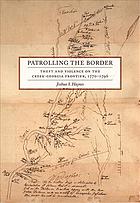

Most ebook files are in PDF format, so you can easily read them using various software such as Foxit Reader or directly on the Google Chrome browser.
Some ebook files are released by publishers in other formats such as .awz, .mobi, .epub, .fb2, etc. You may need to install specific software to read these formats on mobile/PC, such as Calibre.
Please read the tutorial at this link: https://ebookbell.com/faq
We offer FREE conversion to the popular formats you request; however, this may take some time. Therefore, right after payment, please email us, and we will try to provide the service as quickly as possible.
For some exceptional file formats or broken links (if any), please refrain from opening any disputes. Instead, email us first, and we will try to assist within a maximum of 6 hours.
EbookBell Team

0.0
0 reviews"Patrolling the Border focuses on a late-eighteenth-century conflict between Muskogee Creeks and Georgians. The conflict was marked by years of seemingly-random theft and violence along the Oconee River, the contested border between the two peoples.Haynes argues that the period should be viewed as the struggle of nonstate indigenous people to develop an effective method of resisting colonization. The Creeks were non-state, indigenous people confronting an aggressive, young imperial state. Georgia's encroachment into the Oconee River valley forced Muskogees into a conversation about the very nature of their political leadership. That conversation hinged on talwa autonomy, a long-standing system of governance in Creek country that privileged the independence of each talwa, or town. At this critical moment in the late eighteenth century, Muskogees faced the prospect of dispensing with the system. The threat of colonialism pushed Creeks to experiment with more centralized, state-like institutions including a robust system of theft and violence that I describe as border patrols. But, throughout the period, they remained committed to their indigenous political system. Creek insistence on talwa autonomy helps explain a pattern of politically-motivated border patrols that otherwise seems random. White Georgians exaggerated the ferocity of Creek warriors to craft an enduring political narrative that justified their own violence and land taking."